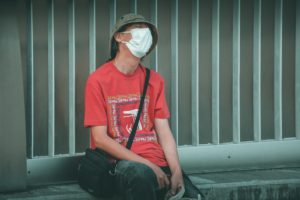Finding Mental Balance During the Pandemic
- April 07, 2020
- Coping
BY JOHN M. OLDHAM, M.D.
 The defensive cloak of denial works only so long. COVID-19, we wanted to believe, was over there. For as long as we could, we refused to see that this ruthless pandemic could take over our country, our town, our street. But no more. Now we know the savage nature of this invisible enemy and that it could be at work in any of us, even without our knowing it.
The defensive cloak of denial works only so long. COVID-19, we wanted to believe, was over there. For as long as we could, we refused to see that this ruthless pandemic could take over our country, our town, our street. But no more. Now we know the savage nature of this invisible enemy and that it could be at work in any of us, even without our knowing it.
Without that cloak, we are unprotected from the widespread anxiety that accompanies the harsh evidence of our shared vulnerability and mortality. Now we see it: No one is invulnerable—from Prince Charles to Tom Hanks to Boris Johnson to Chris Cuomo to the doctors, nurses, firemen, policemen, our parents, our grandparents, ourselves. Previous “breaking news” reports about Brexit, NATO, climate change, and, of course, political rallies and debates have been sidelined, except for the intense scrutiny on the leaders of the world and the wisdom of their decisions about how best to protect their citizens.
Worried and stressed
Some of us are natural worriers, prone to feel anxious about the risks of daily life such as high-speed traffic, a shaky investment, a leak in the roof, or, unfortunately, a school shooting. COVID-19 might, curiously, seem to be a validation of the wisdom of the worriers, who may be better stocked with provisions than most of us, anticipating the next flood or hurricane or other disaster.
But all of us have heritable risk factors to develop illnesses such as diabetes, hypertension, heart disease, cancer, depression, anxiety disorders, and even personality disorders. If our degree of risk is at least moderately high, an epigenetic stress of the magnitude of this pandemic is bound to flip the switch and turn on some of our risk genes. And in the mental health world, that could be a full-blown anxiety disorder, or a depressive disorder, or an acute stress disorder, or PTSD, or other conditions.
Start managing the anxiety
Most if not all of us are in a state of heightened anxiety. The longer this public health emergency continues, the more urgent it becomes to manage the anxiety. One essential strategy for minimizing the daily jolts is to fortify ourselves with solid, scientific, and, where possible, evidence-based knowledge about this viral invader. Steer clear of the blazing doomsday alarms that saturate the airwaves and the web; rely, instead, on the well-informed words of medical and scientific experts, updated regularly on websites such as the National Institutes of Health, the Centers for Disease Control and Prevention, and the World Health Organization. Doing so helps us protect our mental balance–though, so far, this deadly virus knows more about itself than our experts do.
More to come
Throughout this ordeal, it will help to recognize that the world has been here before, and we will prevail.

